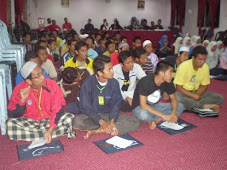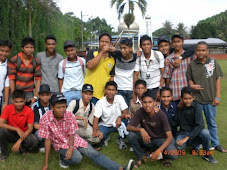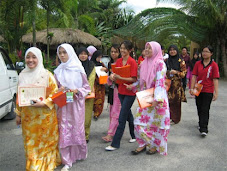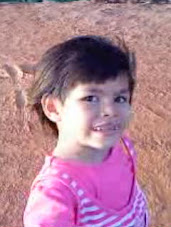From Wikipedia, the free encyclopedia
Jump to: navigation, search
Unbalanced scales.svg
The neutrality of this article is disputed. Please see the discussion on the talk page. Please do not remove this message until the dispute is resolved. (December 2007)
Hassan al-Banna - حسن البنا
Born October 14, 1906(1906-10-14)
Mahmoudiyah, Beheira, Egypt
Died February 12, 1949
Cairo, Egypt
Residence Mahmoudiyah, Egypt
Occupation General Guide of the Muslim Brothers
Religious beliefs Sunni Islam
Hassan al-Banna (Arabic: حسن البنا, October 14, 1906 – February 12, 1949) was an Egyptian social and Islamist political reformer, best known for founding the Muslim Brotherhood, one of the largest and most influential 20th century Muslim revivalist organizations. Al-Banna's leadership was critical to the growth of the brotherhood during the 1930s and 1940s.
Contents
[hide]
* 1 Biography
o 1.1 Early life
o 1.2 The Dar al-Ulum Years
o 1.3 Establishment of the Muslim Brothers
o 1.4 Political Activity
o 1.5 Last Days and Assassination
* 2 Legacy
* 3 Program
* 4 See also
* 5 Notes
* 6 References
* 7 External links
[edit] Biography
[edit] Early life
Banna was born in 1906 in Mahmudiyya, Egypt (north-west of Cairo). His father, Shaykh Ahmad al-Banna, was a respected local imam (prayer leader) and mosque teacher of the Hanbali rite. He was not educated at Al-Azhar University (Lia 24, 1998). He wrote and collaborated on books on Muslim traditions, and also had a shop where he repaired watches and sold gramophones. Though Shaykh Ahmad al Banna and his wife owned some property, they were not wealthy and struggled to make ends meet, particularly after they moved to Cairo in 1924. Like many others, they found that Islamic learning and piety were no longer as highly valued in the capital, and that craftsmanship could not compete with large-scale industry.[1][2]
When Hassan al-Banna was twelve years old, he became involved in a Sufi order, and became a fully initiated member in 1922.[3][4] At the age of thirteen, he participated in demonstrations during the revolution of 1919 against British rule.[5][6]
[edit] The Dar al-Ulum Years
In 1923, at the age of 16, Al-Banna moved to Cairo to enter the Dar al-Ulum college. Life in the capital offered him a greater range of activities than the village and the opportunity to meet prominent Islamic scholars (in large measure thanks to his father's acquaintances), but he was deeply disturbed by effects of Westernization he saw there, particularly the rise of secularism and the breakdown of traditional morals.[7][8] The four years that Al-Banna spent in Cairo exposed him to the political ferment of the Egyptian capital in the early 1920s, and enhanced his awareness of the extent to which secular and Western ways had penetrated the very fabric of society.
It was then that Al-Banna became particularly preoccupied with what he saw as the young generation's drift away from Islam. He believed that the battle for the hearts and minds of the youth would prove critical to the survival of a religion besieged by a Western onslaught. While studying in Cairo, he immersed himself in the writings of the founders of Islamic reformism, including the Egyptian Muhammad 'Abduh, under whom his father had studied while at Al-Azhar.
But it was 'Abduh's disciple, the Syrian Rashid Rida, who most influenced Al-Banna. Al-Banna was a dedicated reader of Al-Manar, the magazine that Rida published in Cairo from 1898 until his death in 1935. He shared Rida's central concern with the decline of Islamic civilization relative to the West. He too believed that this trend could be reversed only by returning to an unadulterated form of Islam, free from all the accretions that had diluted the strength of its original message. Like Rida at the end of his life — but unlike 'Abduh and other Islamic modernists — Al-Banna felt that the main danger to Islam's survival in the modern age stemmed less from the conservatism of Al-Azhar and the Ulema (which he nevertheless criticized) than from the ascendancy of Western secular ideas.
He was equally disappointed with what he saw as the failure of the Islamic scholars of al-Azhar University to voice their opposition to the rise of atheism and to the influence of Christian missionaries.[9]
In his last year at Dar al-Ulum, he wrote that he had decided to dedicate himself to becoming "a counselor and a teacher" of adults and children, in order to teach them "the objectives of religion and the sources of their well-being and happiness in life". He graduated in 1927 and was given a position as an Arabic language teacher in a state primary school in Ismaïlia, a provincial town located in the Suez Canal Zone.[10]
[edit] Establishment of the Muslim Brothers
It was to spread this message that Al-Banna launched the Society of the Muslim Brothers in March 1928. At first, the society was only one of the numerous small Islamic associations that existed at the time. Similar to those that Al-Banna himself had joined since he was 12, these associations aimed to promote personal piety and engaged in charitable activities. By the late 1930s, it had established branches in every Egyptian province.
A decade later, it had 500,000 active members and as many sympathizers in Egypt alone, while its appeal was now felt in several other countries as well. The society's growth was particularly pronounced after Al-Banna relocated its headquarters to Cairo in 1932. The single most important factor that made this dramatic expansion possible was the organizational and ideological leadership provided by Al-Banna.
In Ismaïlia, in addition to his day classes, he carried out his intention of giving night classes to his pupils' parents. He also preached in the mosque, and even in coffee-houses, which were then a novelty and were generally viewed as morally suspect. At first, some of his views on relatively minor points of Islamic practice led to strong disagreements with the local religious élite, and he adopted the policy of avoiding religious controversies.[11][12]
He was appalled by the many conspicuous signs of foreign military and economic domination in Isma'iliyya: the British military camps, the public utilities owned by foreign interests, and the luxurious residences of the foreign employees of the Suez Canal Company, next to the squalid dwellings of the Egyptian workers.[11]
[edit] Political Activity
He endeavored to bring about the changes he hoped for through institution-building, relentless activism at the grassroots level, and a reliance on mass communication. He proceeded to build a complex mass movement that featured sophisticated governance structures; sections in charge of furthering the society's values among peasants, workers, and professionals; units entrusted with key functions, including propagation of the message, liaison with the Islamic world, and press and translation; and specialized committees for finances and legal affairs.
In anchoring this organization into Egyptian society, Al-Banna relied on pre-existing social networks, in particular those built around mosques, Islamic welfare associations, and neighborhood groups. This weaving of traditional ties into a distinctively modern structure was at the root of his success. Directly attached to the brotherhood, and feeding its expansion, were numerous businesses, clinics, and schools. In addition, members were affiliated to the movement through a series of cells, revealingly called usar (families. singular: usrah).
The material, social and psychological support thus provided were instrumental to the movement's ability to generate enormous loyalty among its members and to attract new recruits. The services and organizational structure around which the society was built were intended to enable individuals to reintegrate into a distinctly Islamic setting, shaped by the society's own principles.
Rooted in Islam, Al-Banna's message tackled issues including colonialism, public health, educational policy, natural resources management, Marxism, social inequalities, Arab nationalism, the weakness of the Islamic world on the international scene, and the growing conflict in Palestine. By emphasizing concerns that appealed to a variety of constituencies, Al-Banna was able to recruit from among a cross-section of Egyptian society — though modern-educated civil servants, office employees, and professionals remained dominant among the organization's activists and decisionmakers.
Al-Banna was also active in resisting British imperialism in Egypt. During World War II, he was briefly arrested by the pro-British administration, who saw him as subversive.
[edit] Last Days and Assassination
Between 1948 and 1949, shortly after the society sent volunteers to fight in the war in Palestine, the conflict between the monarchy and the society reached its climax. Concerned with the increasing assertiveness and popularity of the brotherhood, as well as with rumors that it was plotting a coup, Prime Minister Mahmoud an-Nukrashi Pasha disbanded it in December 1948. The organization's assets were impounded and scores of its members sent to jail. Less than three weeks later, the prime minister was assassinated by a member of the brotherhood.
This in turn prompted the assassination of Al-Banna. On February 12, 1949 in Cairo, Al-Banna was at the Jamiyyah al-Shubban al-Muslimeen headquarters with his brother in-law Abdul Karim Mansur to negotiate with Minister Zaki Ali Basha who represented the government side. Minister Zaki Ali Basha never arrived. By 5 o'clock in the evening Al-Banna and his brother-in-law decided to leave. The assassination happened when Al-Banna and his brother in-law called a taxi. As they stood waiting for the taxi, they were shot by two men. Al-Banna was hit by seven shots. Laterwards, he was taken to hospital and they had received orders from the monarchy to not give him any treatment where he died a slow death from the wounds. He was 43 years old, and at the height of his career.
[edit] Legacy
Hassan al-Banna is known to have great impact in the modern Islamic thought.[13]
He is the grandfather of Tariq Ramadan and older brother of Gamal al-Banna.
[edit] Program
To help consecrate the Islamic order, al-Banna called for banning all Western influence from education and ordered that all primary schools should be part of the mosques. He also wanted a ban on political parties and democratic institutions other than a Shura (Islamic-council) and wanted all government officials to have a religious study as main education.
Hassan al-Banna saw Jihad as a God-ordained defensive strategy, stating that most Islamic scholars: "Agree unanimously that jihad is a communal defensive obligation imposed upon the Islamic ummah in order to broadcast the summons (to embrace Islam), and that it is an individual obligation to repulse the attack of unbelievers upon it." However, as a result of unbelievers ruling Muslim lands and humbling Muslim honor: "It has become an individual obligation, which there is no evading, on every Muslim to prepare his equipment, to make up his mind to engage in jihad, and to get ready for it until the opportunity is ripe and God decrees a matter which is sure to be accomplished.[14]"
al-Banna does not accept claims as sound the Hadith that the jihad of the spirit is the greater jihad, and the jihad of the sword the lesser jihad, and he glorifies active defensive jihad: "supreme martyrdom is only conferred on those who slay or are slain in the way of God. As death is inevitable and can happen only once, partaking in jihad is profitable in this world and the next.[15]"
The vision of al-Banna on the rule of Jihad for the Ummah (Muslim community) in a citation of the Five Tracts of Hasan al-Banna in which he goes back to the Hanafi-rules: "Jihad in its literal significance means to put forth one's maximal effort in word and deed; in the Sacred Law it is the slaying of the unbelievers, and related connotations such as beating them, plundering their wealth, destroying their shrines, and smashing their idols." and "it is obligatory on us to begin fighting with them after transmitting the invitation [to embrace Islam], even if they do not fight against us
sumber dipetik dari: http://en.wikipedia.org/wiki/Hassan_al-Banna



















